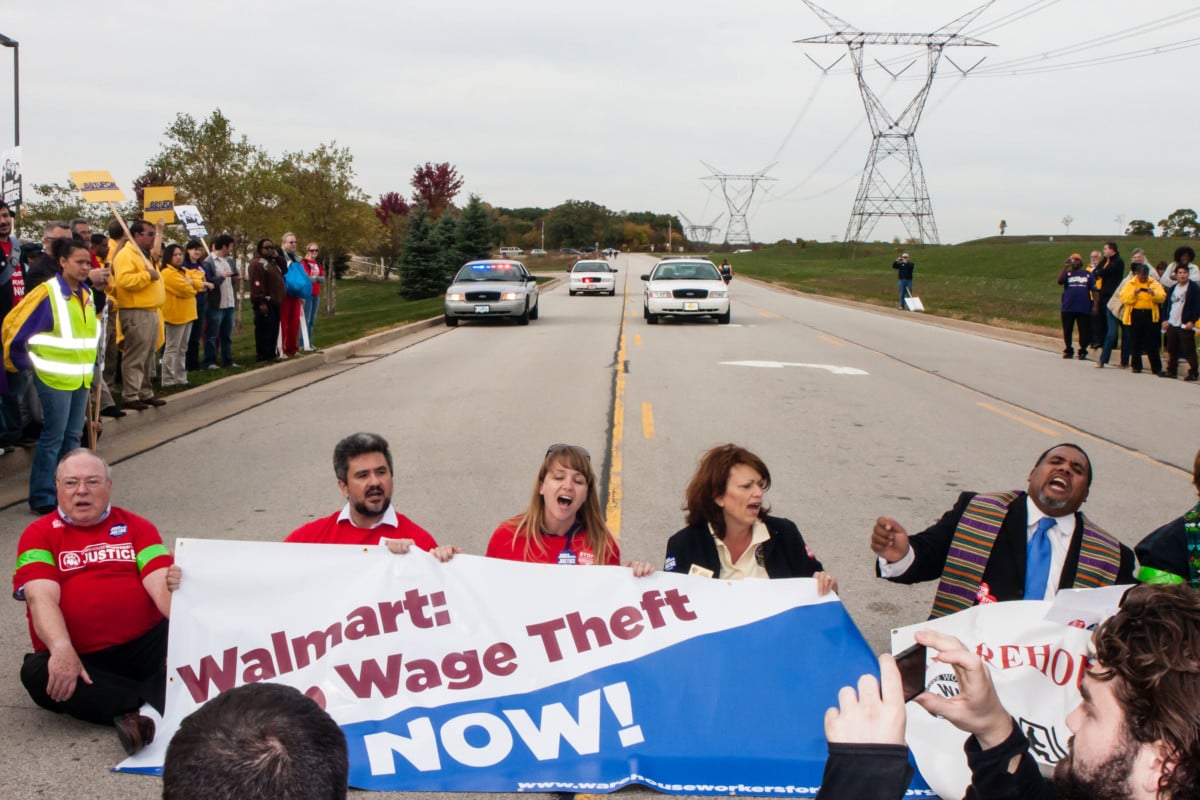Did you know that Truthout is a nonprofit and independently funded by readers like you? If you value what we do, please support our work with a donation.
A “jaw-dropping” wage theft report out this week reveals that many top US corporations—from Walmart to Bank of America to AT&T—”have fattened their profits by forcing employees to work off the clock or depriving them of required overtime pay,” based on a review of labor lawsuits and enforcement actions.
Grand Theft Paycheck: The Large Corporations Shortchanging Their Workers’ Wages (pdf), produced by Good Jobs First and the Jobs With Justice Education Fund, found that hundreds of firms have collectively paid billions of dollars in wage theft penalties since 2000.
The report identifies several wage theft practices such as off-the-clock work, job title misclassifications that unfairly exempt workers from overtime pay, and uncompensated clothing purchase requirements, as well as overtime, minimum wage, meal break, and tip violations.
Researchers uncovered more than 1,200 successful collective actions challenging large companies’ bad behavior. Those cases cost top corporations a total of $8.8 billion. A review of actions by the U.S. Department of Labor and eight state regulatory agencies uncovered another 4,220 cases against major corporations, which produced $9.2 billion in penalites.
“Our findings make it clear that wage theft goes far beyond sweatshops, fast-food outlets, and retailers. It is built into the business model of a substantial portion of corporate America,” said Good Jobs First research director Philip Mattera, the report’s lead author.
The employers who paid the most penalties for wage theft violations ranged from retailers and banks to insurance and telecommunications companies, the report highlights:
Among the dozen most penalized corporations, Walmart, with $1.4 billion in total settlements and fines, is the only retailer. Second is FedEx with $502 million. Half of the top dozen are banks and insurance companies, including Bank of America ($381 million); Wells Fargo ($205 million); JPMorgan Chase ($160 million); and State Farm Insurance ($140 million). The top 25 also include prominent companies in sectors not typically associated with wage theft, including telecommunications (AT&T); information technology (Microsoft and Oracle); pharmaceuticals (Novartis); and investment services (Morgan Stanley and UBS).
Kilian Colin, who worked for Wells Fargo from 2013 to 2016, said that “aggressive sales quotas based on exploiting vulnerable customers forced me into 12-hour shifts with no breaks and no food allowed—and threats to withhold my paycheck if I didn’t sign off on working extra hours for free.”
The report suggests such experiences are common among those who work for major American companies. Demos Action researcher Tamara Draut, who was not involved in the study, said the report’s documentation of stolen wages provides “one more reason for unions.”
Jobs With Justice Education Fund senior policy analyst Adam Shah, who contributed to the report, said that in light of the findings, there’s also a need for crafting stronger policies to protect workers, and that recent developments in government have renewed energy to address the issue of wage theft.
“We see increased urgency for policymakers to step up with solutions,” Shah noted, “because the US Supreme Court recently made it harder to bring collective action lawsuits to stop wage theft and the Trump Administration may weaken federal enforcement.”
Pointing to California’s enhanced labor protections as a potential blueprint, Shah concluded, “While wage theft is pervasive, it is also preventable.”
Media that fights fascism
Truthout is funded almost entirely by readers — that’s why we can speak truth to power and cut against the mainstream narrative. But independent journalists at Truthout face mounting political repression under Trump.
We rely on your support to survive McCarthyist censorship. Please make a tax-deductible one-time or monthly donation.
